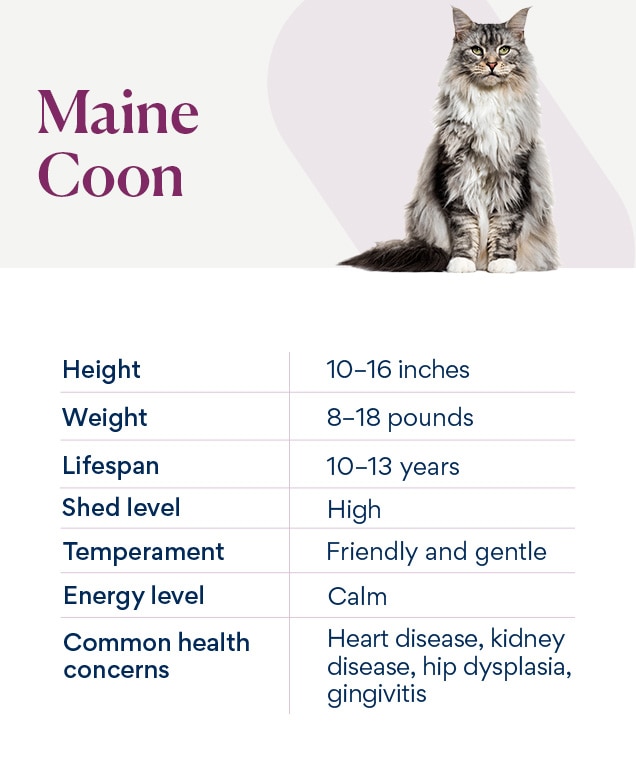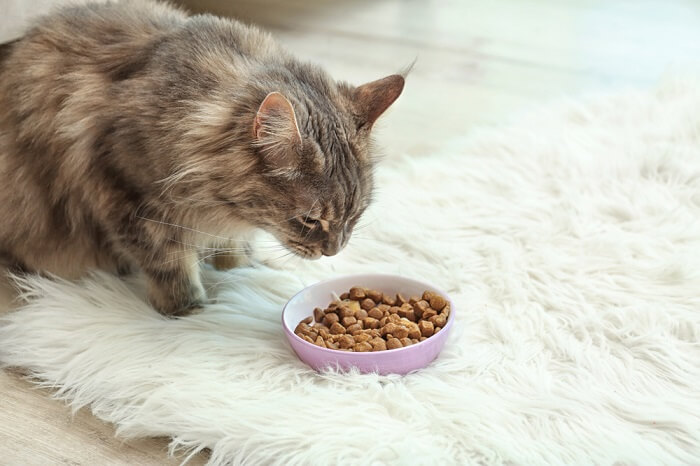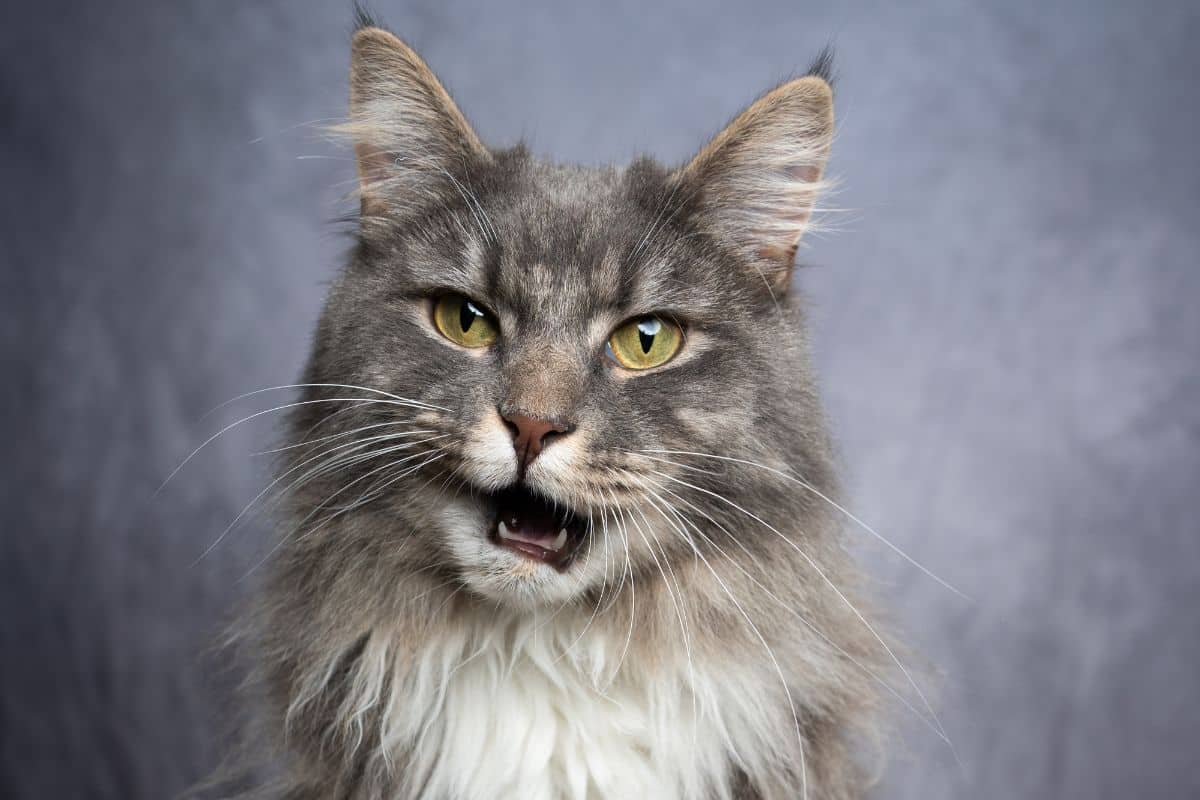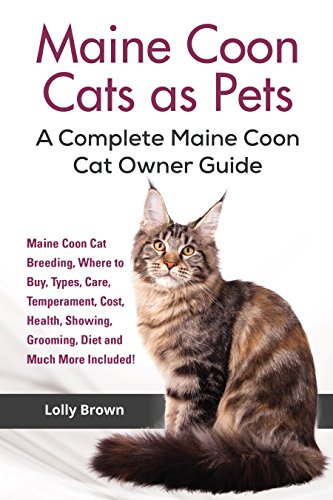Feed your Maine Coon approximately 3/4 to 1 cup of dry food daily, split into two meals. Adjust portions based on age, weight, and activity level.
Maine Coons are among the largest domesticated cat breeds, known for their majestic appearance and friendly personalities. These gentle giants require a balanced diet to maintain their health and energy levels. Proper nutrition is crucial for their growth, especially during their kitten phase, which lasts longer than most other breeds.
Owners should monitor their Maine Coon’s food intake to prevent obesity, as this breed can be prone to weight gain. A mix of dry kibble and wet food can ensure they get enough moisture and nutrients. It’s essential to consult with a veterinarian to tailor a feeding plan that matches your Maine Coon’s specific needs.

Credit: www.petmd.com
Decoding A Maine Coon’s Dietary Needs
Owners of Maine Coons often ponder over the right amount of food for their furry friends. This majestic breed is unlike any other, requiring a diet that caters to their unique needs.
Size And Metabolism: The Basics
Maine Coons are one of the largest domesticated cat breeds. Their diets need to match their size. An adult Maine Coon weighs between 13 to 18 pounds, sometimes more.
But size isn’t the only factor to consider. Metabolism plays a key role too.A cat’s metabolism determines how quickly they convert food into energy. Maine Coons are known for a slower metabolism. This affects their dietary requirements.
So, what does this mean for feeding?
- A balanced diet is crucial.
- Meals should be rich in proteins and low in carbohydrates.
- Portion control is essential to avoid weight gain.
Use the following table to determine your Maine Coon’s basic food needs:
| Weight Range | Daily Calories |
|---|---|
| 13-18 lbs | 210-350 Kcal |
| Over 18 lbs | 350+ Kcal |
Age Factors: Kitten To Senior
The age of a Maine Coon influences its diet.
Kittens are growing rapidly and need more calories.They require frequent meals, ideally 4-5 times a day. Their food should be high in protein for muscle development.
Adult Maine Coons require consistent, balanced meals.Usually, twice a day works well for adults. Meals should keep them lean and muscular, but not overweight.
As Maine Coons mature, their activity levels tend to drop. Seniors need fewer calories compared to adults. They may also need special diets for health issues.
Here’s an age-based feeding guide:
- Kittens (under 1 year): High-calorie, protein-rich diet.
- Adults (1-10 years): Balanced, portion-controlled meals.
- Seniors (10+ years): Lower-calorie diet, supplements if needed.
Nutritional Requirements For Maine Coons
Maine Coons are known for their majestic size and regal appearance. This breed requires special attention to its nutrition to maintain a healthy lifestyle. High-quality food meeting their unique dietary needs ensures these gentle giants get all the necessary nutrients. Let’s dive into what makes up a balanced diet for Maine Coons.
Macronutrients: Building A Balanced Diet
Macronutrients are the cornerstone of any pet’s diet, and Maine Coons are no exception. A balanced blend of proteins, fats, and carbohydrates is crucial for their overall health.
- Proteins: Essential for muscle growth and repair. Choose foods with high-quality animal proteins.
- Fats: Provide energy and help absorb certain vitamins. Healthy fats like omega-3 are especially beneficial for a Maine Coon’s thick fur.
- Carbohydrates: Support digestive health. Opt for complex carbs, such as those found in vegetables and some grains.
Vitamins And Minerals: Essential Additions
Beyond macronutrients, vitamins and minerals are vital for a Maine Coon’s health. They support bone health, nerve function, and immune system strength.
| Vitamin/Mineral | Function |
|---|---|
| Calcium | Supports strong bones and teeth. |
| Phosphorus | Works with calcium; important for kidney health. |
| Vitamin A | Essential for vision. |
| Vitamin E | Acts as an antioxidant; good for skin and coat. |
A diet supplemented with these vitamins and minerals, either through high-quality commercial foods or specific supplements, will keep a Maine Coon in optimal health. Always consult a veterinarian before making dietary changes.
Calculating Daily Food Portions
Understanding how much to feed your magnificent Maine Coon can be a puzzle worth solving. Proper nutrition is pivotal for their health and happiness. The process becomes simple with a bit of calculation and understanding of your furry friend’s needs. Let’s dive into how to calculate the right daily food portions for your Maine Coon.
Body Weight And Activity Levels
Maine Coons range in size, and their needs vary. A standard guideline suggests an average adult Maine Coon should consume between 24 to 35 calories per pound of body weight daily. Here’s a brief table to help you understand:
| Body Weight | Calories per Day |
|---|---|
| 10 lbs | 240 – 350 calories |
| 15 lbs | 360 – 525 calories |
| 20 lbs | 480 – 700 calories |
| 25 lbs | 600 – 875 calories |
Remember, active cats need more calories. Look at your pet’s lifestyle. Is it playful and energetic or more on the sedate side?
Commercial Food: Reading The Labels
Commercial foods make feeding easy but reading the labels is key. Companies provide guidelines based on weight. But each cat is unique. You may need to adjust accordingly.
- Look for feeding guides on the package.
- Measure the recommended portion as a starting point.
- Monitor your cat’s weight regularly.
- Consult your vet for a personalized plan.
Feeding your Maine Coon the right amount is much easier with these pointers. Keep your cat thriving with the perfect balance in its diet.

Credit: cats.com
Homemade Meals Versus Commercial Diets
Deciding between homemade meals and commercial diets is crucial for your Maine Coon’s health. A balanced diet ensures your cat maintains its distinctive, luxurious coat and remains in peak physical condition. Let’s dive into the benefits and drawbacks of homemade food as well as tips for selecting the best commercial brand.
Pros And Cons Of Homemade Food
Benefits of Homemade Food::- Fresh Ingredients: You control what goes into each meal.
- Customizable: Tailor recipes to your cat’s specific needs.
- No Additives: Avoid preservatives and fillers found in some store brands.
- Time-Consuming: Preparing meals takes effort and planning.
- Nutrient Balance: It’s tricky to match a cat’s dietary requirements.
- Storage: Homemade food lacks the shelf-life of commercial options.
Choosing The Right Commercial Food Brand
Selecting a commercial food brand can be overwhelming. Focus on high-quality options that cater to the unique dietary needs of Maine Coons. Look for these key attributes:
Desired Features in Commercial Food:| Feature | Description |
|---|---|
| High Protein | Supports muscle growth and energy levels. |
| Low Carbohydrates | Prevents unnecessary weight gain. |
| Taurine | Essential amino acid for heart health. |
| Fatty Acids | Promotes a shiny coat and healthy skin. |
Always check for the AAFCO statement on the packaging. This ensures the food meets standard nutritional levels. Research and read reviews to find a reputable brand trusted by Maine Coon owners. Adjust portions according to your cat’s age, weight, and activity level. Always consult a veterinarian before making significant changes to your cat’s diet.
Feeding Schedules And Routines
Setting a consistent feeding schedule benefits your Maine Coon’s health and well-being. Proper, timely meals support their growth and energy levels. Let’s explore the best feeding times and the role of treats in your Maine Coon’s diet.
Determining The Best Feeding Times
Feeding your Maine Coon at the same times daily helps regulate their digestion. Young kittens need multiple small meals, while adults do well with two meals a day. Consider your daily routine and choose times when you can be consistent. An example schedule for adults could be:
| Meal | Time |
|---|---|
| Morning | 7 AM |
| Evening | 6 PM |
Always keep fresh water available. Maine Coons drink often to stay hydrated.
The Role Of Treats In Your Cat’s Diet
Treats are great for bonding and training, but they should be less than 10% of your Maine Coon’s daily intake. Choose healthy options. Avoid overfeeding with treats to prevent weight gain.
- Use treats for positive reinforcement during training.
- Offer treats between meals, not as a meal replacement.
- Opt for dental treats to support oral health.
Remember, a balanced diet makes a happy, healthy Maine Coon.
Monitoring Maine Coon Health And Diet
Monitoring the health and diet of a Maine Coon is crucial for its welfare. These large felines have unique nutritional needs. Careful attention ensures they stay vigorous and content.
Signs Of Improper Feeding
Maine Coons show clear signs when their diet is off-balance. Here’s what to watch out for:
- Weight Changes: Sudden weight loss or gain isn’t normal.
- Coat Quality: Dull, thinning fur indicates poor nutrition.
- Behavior Shifts: Less playfulness may signal a dietary issue.
- Digestive Upsets: Frequent digestive problems require attention.
Regular Check-ins With The Vet
Consistent veterinary visits are key to maintaining a Maine Coon’s health.
| Age | Visit Frequency |
|---|---|
| Under 1 Year | Every 3 Months |
| 1 – 7 Years | Annually |
| 7+ Years | Semi-Annually |
During check-ins, vets assess weight and offer dietary advice. This keeps your Maine Coon on track with its diet and health.

Credit: www.reddit.com
Frequently Asked Questions Of How Much Should You Feed A Maine Coon
Why Is My Maine Coon Cat Always Hungry?
Your Maine Coon cat may always feel hungry due to its high energy needs, growth spurts, or medical issues like diabetes or parasites. It’s crucial to consult a vet to rule out health problems.
How Much Is Food For A Maine Coon?
The cost of food for a Maine Coon typically ranges from $20 to $60 per month, depending on the brand and diet type.
Do Maine Coons Need Dry Food?
Maine Coons can eat dry food as part of a balanced diet. Ensure the food meets their nutritional needs and monitor portion sizes for health maintenance.
What Is A Proper Maine Coon Diet?
A Maine Coon’s diet should be high in protein, moderate in fats, and include limited carbohydrates. Choose quality wet or dry food formulated for large breeds, and ensure fresh water is always available. Regular feeding schedules and portion control are crucial for maintaining optimal health.
Conclusion
Feeding your Maine Coon the right amount is critical for its health. Tailor their diet to age, activity level, and health needs. Remember, quality food over quantity maintains their majestic stature. Consult with a vet to personalize their meals. Keep your gentle giant thriving with balanced nutrition!



